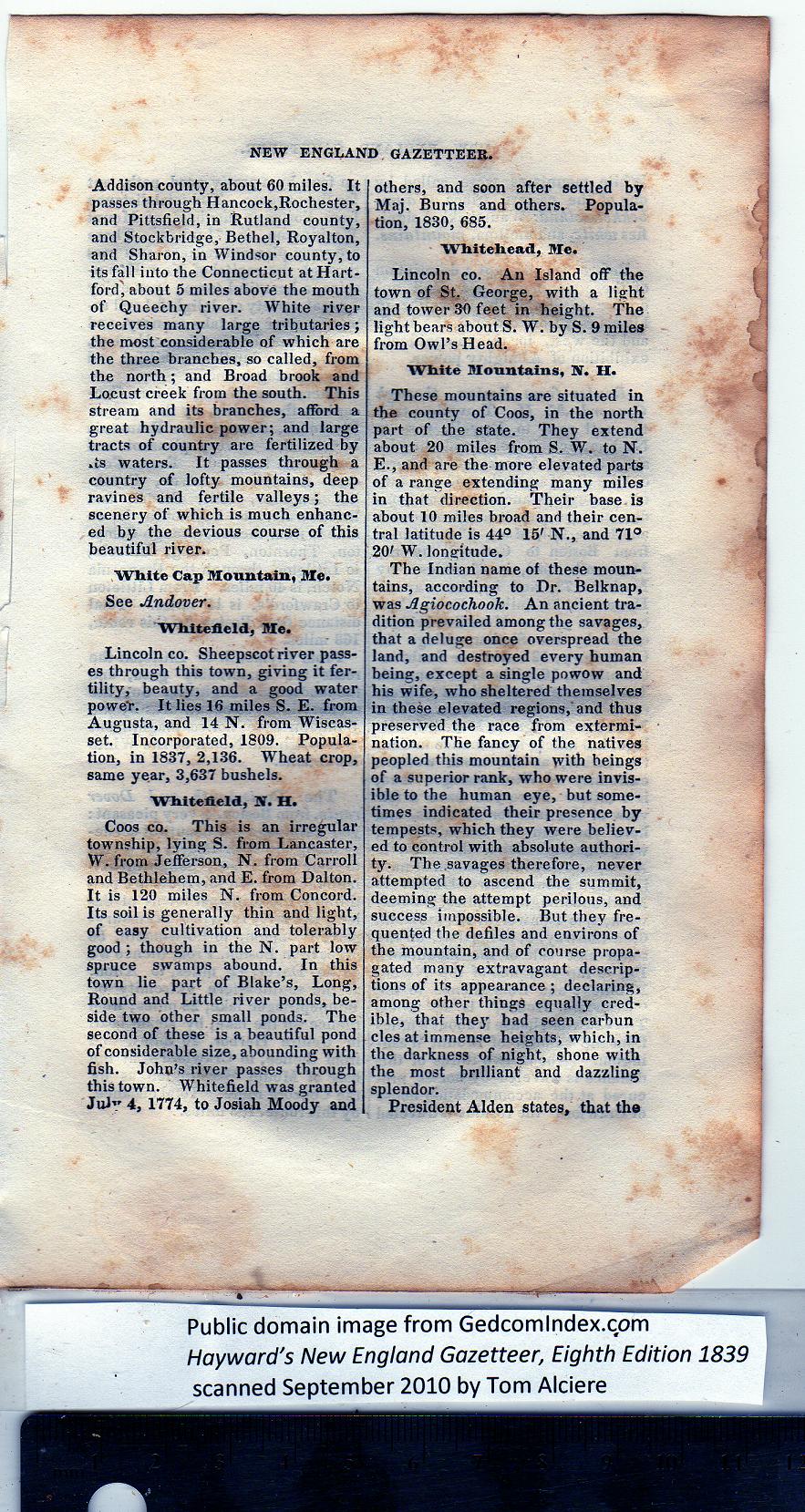|
Addison county, about 60 miles. It
passes through Hancock,Rochester,
and Pittsfield, in Rutland county,
and Stockbridge, Bethel, Royalton,
and Sharon, in Windsor county, to
its fall into the Connecticut at Hart-
ford, about 5 miles above the mouth
of Queechy river. White river
receives many large tributaries;
the most considerable of which are
the three branches, so called, from
the north; and Broad brook and
Locust creek from the south. This
stream and its branches, afford a
great hydraulic power; and large
tracts of country are fertilized by
Rs waters. It passes through a
country of lofty mountains, deep
ravines and fertile valleys; the
scenery of which is much enhanc-
ed by the devious course of this
beautiful river.
Wbite Cap Mountain, Me*
See Andover.
Wbitefield, Me*
Lincoln co. Sheepscot river pass-
es through this town, giving it fer-
tility, beauty, and a good water
power. It lies 16 miles S. E. from
Augusta, and 14 N. from Wiscas-
set. Incorporated, 1809. Popula-
tion, in 1837, 2,136. Wheat crop,
same year, 3,637 bushels.
Wbitefield, X. H.
Coos co. This is an irregular
township, lying S. from Lancaster,
W. from Jefferson, N. from Carroll
and Bethlehem, and E. from Dalton.
It is 120 miles N. from Concord.
Its soil is generally thin and light,
of easy cultivation and tolerably
good ; though in the N. part low
spruce swamps abound. In this
town lie part of Blake’s, Long,
Round and Little river ponds, be-
side two other small ponds. The
second of these is a beautiful pond
of considerable size, abounding with
fish. John’s river passes through
this town. Whitefield was granted
JuJy 4, 1774, to Josiah Moody and
others, and soon after settled by
Maj. Burns and others. Popula-
tion, 1830, 685. |
Wbitebead, Me.
Lincoln co. An Island off the
town of St. George, with a light
and tower 30 feet in height. The
light bears about S. W. by S. 9 miles
from Owl’s Head.
Wbite Mountains, X. H<
These mountains are situated in
the county of Coos, in the north
part of the state. They extend
about 20 miles from S. W. to N.
E., and are the more elevated parts
of a range extending many miles
in that direction. Their base is
about 10 miles broad and their cen-
tral latitude is 44° 15' N., and 71°
20' W. longitude.
The Indian name of these moun-
tains, according to Dr. Belknap,
was Agiocochook. An ancient tra-
dition prevailed among the savages,
that a deluge once overspread the
land, and destroyed every human
being, except a single powow and
his wife, who sheltered themselves
in these elevated regions,'and thus
preserved the race from extermi-
nation. The fancy of the natives
peopled this mountain with beings
of a superior rank, who were invis-
ible to the human eye, but some-
times indicated their presence by
tempests, which they were believ-
ed to control with absolute authori-
ty. The.savages therefore, never
attempted to ascend the summit,
deeming the attempt perilous, and
success impossible. But they fre-
quented the defiles and environs of
the mountain, and of course propa-
gated many extravagant descrip-
tions of its appearance ; declaring,
among other things equally cred-
ible, that they had seen carbun
cles at immense heights, which, in
the darkness of night, shone with
the most brilliant and dazzling
splendor.
President Alden states, that the |
